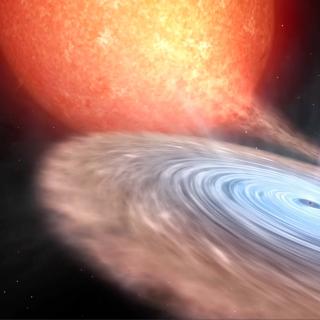Bibcode
Muñoz-Darias, T.; Casares, J.; Martínez-Pais, I. G.
Referencia bibliográfica
Monthly Notices of the Royal Astronomical Society, Volume 385, Issue 4, pp. 2205-2209.
Fecha de publicación:
4
2008
Número de citas
116
Número de citas referidas
107
Descripción
We apply the K-correction to the black hole low-mass X-ray binary (LMXB)
GX 339-4 which implies MX >= 6Msolar by only
assuming that the companion is more massive than ~0.17Msolar,
the lower limit allowed by applying a `stripped-giant' model. This
evolutionary model successfully reproduces the observed properties of
the system. We obtain a maximum mass for the companion of M2
<= 1.1Msolar and an upper limit to the mass ratio of
q(=M2/MX) <= 0.125. The high X-ray activity
displayed by the source suggests a relatively large mass transfer rate
which, according to the model, results in M2 >~
0.3Msolar and MX >~ 7Msolar. We have
also applied this scenario to the black hole binary XTE J1550-564, which
has a similar orbital period but the donor is detected
spectroscopically. The model successfully reproduces the observed
stellar parameters.
Proyectos relacionados

Agujeros negros, estrellas de neutrones, enanas blancas y su entorno local
Los agujeros negros y estrellas de neutrones en binarias de rayos-X son laboratorios únicos para explorar la física de estos objetos compactos. No solo permiten confirmar la existencia de agujeros negros de origen estelar a través de mediciones dinámicas de sus masas, sino que también permiten investigar el comportamiento de la materia y la
Montserrat
Armas Padilla